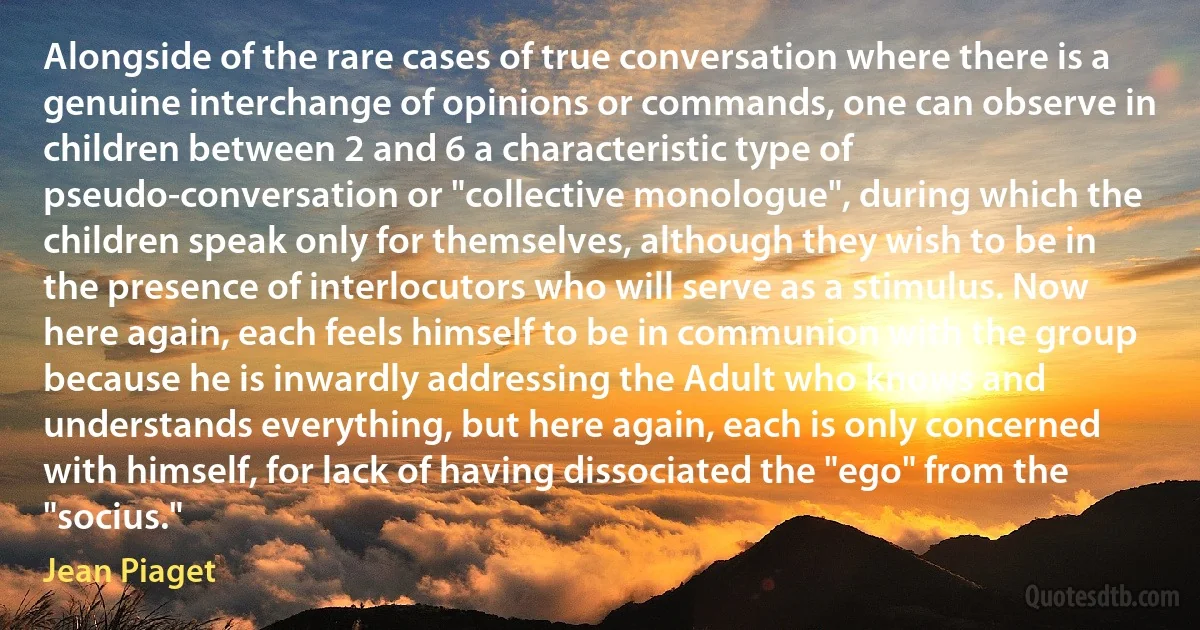
Alongside of the rare cases of true conversation where there is a genuine interchange of opinions or commands, one can observe in children between 2 and 6 a characteristic type of pseudo-conversation or "collective monologue", during which the children speak only for themselves, although they wish to be in the presence of interlocutors who will serve as a stimulus. Now here again, each feels himself to be in communion with the group because he is inwardly addressing the Adult who knows and understands everything, but here again, each is only concerned with himself, for lack of having dissociated the "ego" from the "socius."
Jean PiagetRelated topics
addressing adult characteristic children communion conversation everything having interchange lack monologue now observe presence serve speak stimulus wish feelsRelated quotes
The Cubists, to be objective, restrict themselves to considering things by turning around them, to produce their geometric writing. So they remain at a stage of intelligence which sees everything and feels nothing, which brings everything to a standstill in order to describe everything. We Futurists are trying, on the contrary, with the power of intuition, to place ourselves at the very center of things, in such a way that our ego forms with their own uniqueness a single complex. We thus give plastic planes a plastic expansion in space, obtaining this feeling of something in perpetual motion which is peculiar to everything living.

Carlo Carrà
Whatever plane our consciousness may be acting in, both we and the things belonging to that plane are, for the time being, our only realities. As we rise in the scale of development we perceive that during the stages through which we have passed we mistook shadows for realities, and the upward progress of the Ego is a series of progressive awakenings, each advance bringing with it the idea that now, at last, we have reached "reality"; but only when we shall have reached the absolute Consciousness, and blended our own with it, shall we be free from the delusions produced by Maya [illusion].

Helena Petrovna Blavatsky
When we were sitting in this courtroom, during the jury selection proves, i listened to Judge Thompson tell you about the amerikan system of justice. He talked about the presumption of innocence; he talked about equality and justice. His words were like a beautiful dream in a beautiful world. But i have been awaiting trial for two and one half years. And justice, in my eyesight has not been the amerikan dream. It has been the amerikan nightmare. There was a time when I wanted to believe that there was justice in this country. But reality crashed through and shattered all my daydreams. While awaiting trial i have earned a Ph.D. in justice, or rather, the lack of it.

Assata Shakur
For him it was a dark passage which led to nowhere, then to nowhere, then again to nowhere, once again to nowhere, always and forever to nowhere, heavy on the elbows in the earth to nowhere, dark, never any end to nowhere, hung on all time always to unknowing nowhere, this time and again for always to nowhere, now not to be borne once again always and to nowhere, now beyond all bearing up, up, up and into nowhere, suddenly, scaldingly, holdingly all nowhere gone and time absolutely still and they were both there, time having stopped and he felt the earth move out and away from under them.

Ernest Hemingway
We are grateful to The Washington Post, The New York Times, Time magazine and other great publications whose directors have attended our meetings and respected their promises of discretion for almost forty years. ... It would have been impossible for us to develop our plan for the world if we had been subject to the bright lights of publicity during those years. But, the world is now much more sophisticated and prepared to march towards a world government. The supranational sovereignty of an intellectual elite and world bankers is surely preferable to the national auto-determination practiced in past centuries.

David Rockefeller
